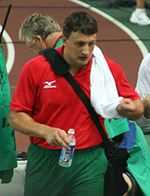Ivan Tsikhan
 Ivan Tikhan at the 2007 World Championships | ||
| Medal record | ||
|---|---|---|
| Men's Athletics | ||
| Representing | ||
| Olympic Games | ||
| Disqualified | 2004 Athens | Hammer |
| Bronze | 2008 Beijing | Hammer[1] |
| World Championships | ||
| Gold | 2003 Paris | Hammer |
| Gold | 2005 Helsinki | Hammer |
| Gold | 2007 Osaka | Hammer |
| European Championships | ||
| Gold | 2006 Gothenburg | Hammer |
| IAAF World Cup in Athletics | ||
| Silver | 2006 Athens | Hammer |
| IAAF World Athletics Final | ||
| Gold | 2005 Monaco | Hammer |
| Gold | 2007 Stuggart | Hammer |
| Silver | 2004 Monaco | Hammer |
| Silver | 2006 Stuggart | Hammer |
| Bronze | 2003 Monaco | Hammer |
| Universiade | ||
| Gold | 2003 Daegu | Hammer |
Ivan Ryhoravich Tsikhan, also spelled sometimes as Ivan Grigoryevich Tikhon (Belarusian: Іва́н Рыго́равіч Ці́хан, Łacinka: Ivan Ryhoravič Cichan, Russian: Ива́н Григо́рьевич Ти́хон; born July 24, 1976) is a Belarusian hammer thrower. He is a three-time world champion, an Olympic medalist, and European champion.
Personal life
Tsikhan was born in the village of Hlasievicy, Slonim district, Hrodna voblast in the Belarusian SSR, USSR. He now lives in Hrodna, Belarus. His wife Volha is also an athlete, she is a discus thrower and they have one son, Ivan, together. Tsikhan is coached by the former Olympic champion Sergei Litvinov.[2] He is 185 cm tall and weighs 105 kg.
Sport career
Tsikhan competed at his first World Championships in 1997, but without reaching the final. He also failed to do so at the 1998 European Championships, but finished tied for third in the final at the 2000 Olympic Games. Unfortunately he was ranked fourth because he did not have a superior second best. He then finished sixth at the 2001 Summer Universiade and ninth at the 2002 European Championships, and competed at the 2001 World Championships without reaching the final.
The year 2003 was Tsikhan's break out season. He surpassed the 80-metre barrier for the first time. He became world champion for the first time in 2003 in Paris, with a throw of 83.03 meters. He won the 2003 Summer Universiade, and finished third at the inaugural World Athletics Final. He had a best of 84.32 metres, achieved in August in Minsk.
In 2004, At the 2004 Olympic Games in Athens Tsikhan won the silver medal with a throw of 79.81 metres, however, after retesting his doping sample in 2012 IOC disqualified him.[3] At the World Athletics Final he took the silver. He had a best of 84.46 metres, achieved in August in Minsk.
In 2005, at the 2005 World Championships he successfully defended his world title from Paris with a throw of 83.89 metres. In the Belarusian national championship in Brest in July, he came within one centimeter of the world record of 86.74 held by Youri Sedykh since 1986.[4] At the end of the season he won the World Athletics Final.
In 2006, Tsikhan won the European Championships. He also finished second at the 2006 World Athletics Final and the 2006 World Cup. His season's best throe was 81.12 metres.
In 2007 Tsikhan won his third World Championships with a throw of 83.64 metres. This was his season's best. He again won the 2007 World Athletics Final.
In 2008, Tsikhan had a season's best of 84.51 metres, achieved in July in Grodno. He finished third at the 2008 Olympic Games with a throw of 81.51 metres.
Doping Offense
Both Tsikhan and silver medalist and fellow Belarusian Vadim Devyatovskiy tested positive for abnormal levels of testosterone after the hammer throw finals on August 12, 2008 at the 2008 Summer Olympics. Both men were stripped of their medals by the International Olympic Committee and appealed to the Court of Arbitration for Sport (CAS). If the Court had rejected their appeal, Tsikhan would have served a two-year suspension and been banned from the 2012 Summer Olympics in London.[5] However, In June 2010 the CAS ruled in his favor and due to discrepancies in drug testing he was reawarded his bronze medal.[1] The CAS stated that he was not cleared of suspicion, insisting the verdict "should not be interpreted as an exoneration".[6]
In May 2012 banned substances were found in Tsikhan's samples from the 2004 Summer Olympics after being retested, he was subsequently withdrawn from the 2012 Summer Games,[6] and he was later disqualified by IOC.[3]
Distance Progression
- 2008 84.51 Grodno 09/07/2008
- 2007 83.63 Osaka 27/08/2007
- 2006 81.12 Stuttgart 10/09/2006
- 2005 86.73 Brest, BLR 03/07/2005
- 2004 84.46 Minsk 07/05/2004
- 2003 84.32 Minsk 08/08/2003
- 2002 79.04 Minsk 29/06/2002
- 2001 78.73 Brest, BLR 08/06/2001
- 2000 79.85 Minsk 27/06/2000
- 1999 70.37 04/09/1999
- 1998 78.03 Saint-Denis 04/06/1998
- 1997 77.46 Turku 11/07/1997
- 1996 75.32 Minsk 13/07/1996
- 1995 66.84 01/01/1995
- 1994 62.66 01/01/1994
- 1993 61.32 13/07/1993
- 1992 55.91 06/05/1992
References
- ↑ 1.0 1.1 Engeler, Elaine (June 10, 2010). "CAS Reinstates Medals for Hammer Throwers". Yahoo! Sports. Associated Press. Retrieved 2010-06-15.
- ↑ Tsikhan's 2003 World Championships win
- ↑ 3.0 3.1 "IOC disqualifies four medallists from Athens 2004 following further analysis of stored samples". December 5, 2012
- ↑ Report of Tikhan's 86.73 throw
- ↑ Associated Press (January 6, 2009). "Belarusians appeal Olympic doping violations". ESPN.com.
- ↑ 6.0 6.1 "Olympics 2012 drugs: Hammer thrower withdrawn over Athens test". BBC News Online. 05-08-2012. Retrieved 05-08-2012.
- Ivan Tsikhan profile at IAAF
- Interview with Tsikhan
| |||||
| |||||
| |||||
| Wikimedia Commons has media related to Ivan Tsikhan. |